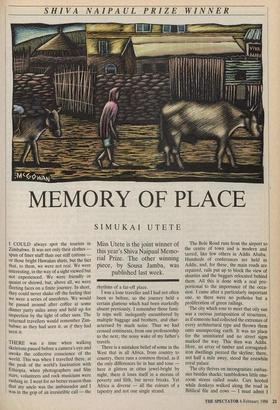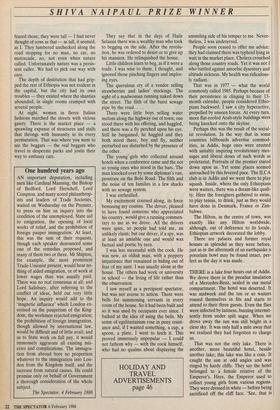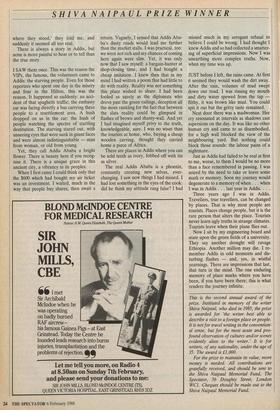SHIVA NAIPAUL PRIZE WINNER
MEMORY OF PLACE
SIMUKAI UTETE
I COULD always spot the tourists in Zimbabwe. It was not only their clothes spun of finer stuff than our stiff cottons or those bright Hawaiian shirts, but the fact that, to them, we were not real. We were interesting, in the way of a sight viewed but not experienced. We were friendly or quaint or shrewd, but, above all, we were fleeting faces on a finite journey. In short, they could never shake off the feeling that we were a series of anecdotes. We would be passed around after coffee at some dinner party miles away and held up for inspection by the light of other suns. The returned travellers would remember Zim- babwe as they had seen it, as if they had seen it.
THERE was a time when walking skeletons passed before a camera's eye and awoke the collective conscience of the world. This was when I travelled there, at the peak of the world's fascination with Ethiopia, when photographers and film stars, volunteers and rock musicians were rushing in. I went for no better reason than that my uncle was the ambassador and I was in the grip of an irresistible call — the
Miss Utete is the joint winner of this year's Shiva Naipaul Memo- rial Prize. The other winning piece, by Sousa Jamba, was published last week.
rhythms of a far-off place.
I was a lone traveller and I had not often been so before, so the journey held a certain glamour which had been markedly absent previously. I remember those fami- ly trips well: inelegantly encumbered by multiple baggage and brothers, and char- acterised by much noise. Thus we had crossed continents, from one professorship to the next, the noisy wake of my father's travels.
There is a mistaken belief of some in the West that in all Africa, from country to country, there runs a common thread, as if the only differences lie in hue and tone here it glitters in cities jewel-bright by night, there it loses itself in a morass of poverty and filth, but never breaks. Yet Africa is diverse — all the colours of a tapestry and not one single strand. The Bole Road runs from the airport to the centre of town and is modern and tarred, like few others in Addis Ababa. Hundreds of conferences are held in Addis, and, for these, the main roads are repaired, rails put up to block the view of shanties and the beggars relocated behind them. All this is done with a zeal pro- portional to the importance of the occa- sion. I came after a particularly important one, so there were no potholes but a proliferation of green railings.
The city which rose to meet that oily sun was a curious juxtaposition of structures, as if someone had collected the extremes of every architectural type and thrown them onto unsuspecting earth. It was no place for the uninitiated and no street signs marked the way. This then was Addis. Here, an array of timber and corrugated- iron dwellings pierced the skyline; there, not half a mile away, stood the erstwhile royal palace.
The city thrives on incongruities: embas- sies besides shacks; tumbledown little one- room stores called souks. Cars hooted while donkeys walked along the road in Biblical file and cows — I must admit I
SHIVA NAIPAUL PRIZE WINNER
feared those; they were tall — I had never thought of cows as that — as tall, it seemed, as I. They lumbered unchecked along the road stopping for no man, no car, no motorcade, no, not even when nature called. Unfortunately nature was a persis- tent caller. We had to pick our way with care.
The depth of destitution that had grip- ped the rest of Ethiopia was not evident in the capital, but the city had its own troubles — they existed where the shanties abounded, in single rooms cramped with several people.
At night, women in fierce Italian fashions marched the streets with vicious gaiety. There is the market place — a sprawling expanse of structures and stalls that throngs with humanity in its every permutation. That was where you went to see the beggars — the real beggars who travel in desperate packs and jostle their way to embassy cars. They say that in the days of Haile Selassie there was a wealthy man who took to begging on the side. After the revolu- tion, he was ordered to desist or to give up his mansion. He relinquished the house.
Little children learn to beg, as if it were a trade. I was wise to them, I thought, and ignored those pinching fingers and implor- ing eyes.
The querulous cry of a vendor selling strawberries and ladies' stockings. The sight of a madwoman running naked down the street. The filth of the burst sewage pipe by the road. . . .
There were little boys selling water melons along the highway out of town; one stood there with his offering, and haggled, and there was a fly perched upon his eye. Still he bargained, he haggled and they both stood there, boy and fly, neither perturbed nor disturbed by the presence of the other.
The young girls who collected around hotels when a conference came and the not so young ones who stood in the bars. The man knocked over by some diplomat's van, prostrate on the Bole Road. The filth and the noise of ten families in a few shacks with no sewage system.
I was enthralled.
My excitement coursed, along, its force bemusing my cousins. The driver, pleased to have found someone who appreciated his country, would give a running commen- tary to me as we drove. All the drivers were spies, so people had told me, an unlikely claim; but our driver, if a spy, was at least an amiable one and would wax factual and poetic by turn.
I was less successful with the cook. He was new, an oldish man, with a peppery impatience that remained in hiding out of fear of my aunt. I was usually alone at the house. The others had work or university or school — the living of life rather than the observation.
I saw myself as a percipient spectator, but was not averse to action. There were bells for summoning servants in every room of the house. So it had been built and so it was used by occupants ever since. I balked at the idea of using the bells. My sense of egalitarianism rose in puny resist- ance and, if I wanted something, a cup, a spoon, a plate, I went to fetch it. This proved immensely unpopular — I could not fathom why — with the cook himself, who had no qualms about displaying the unsmiling side of his temper to me. Never- theless, I was undeterred.
People soon ceased to offer me advice: they had claimed there was typhoid lying in wait in the market place. Cholera crouched along those country roads. Yet it was not I who battled against amoebic dysentery and altitude sickness. My health was ridiculous- ly radiant.
That was in 1977 — what the world commonly called 1985. Perhaps because of their persistence in clinging to their 13- month calendar, people considered Ethio- pians backward. I saw a city hyperactive, propelled by unseen forces. At every turn, more flat-roofed Arab-style buildings were being knocked onto the skyline.
Perhaps this was the result of the social- ist revolution. In the way that in some countries billboards advertise commod- ities, in Addis, huge ones were erected with suitably inspiring revolutionary mes- sages and liberal doses of such words as proletariat. Portraits of the premier stared down upon us. Yet some places seemed untouched by this fevered pace. The ILCA club is in Addis and we went there to play squash. Inside, where the only Ethiopians were waiters, there was a dream-like quali- ty. Here the foreigners gathered to swim, to play tennis, to drink, just as they would have done in Denmark, France or Zim- babwe.
The Hilton, in the centre of town, was exactly like any Hilton worldwide, although, out of deference to its locale, Ethiopian artwork decorated the lobby.
There are palaces and former royal houses as splendid as they were before, just as in the aftermath of an earthquake a porcelain bowl may be found intact, per- fect as the day it was made.
THERE is a lake four hours out of Addis. We drove there in the peculiar insulation of a Mercedes-Benz, sealed in our metal compartment. The hotel was deserted. It was midweek and the ten or so waiters roused themselves in fits and starts to attend to their three guests. Even the flies were infected by laziness, buzzing intermit- tently from under spilt sugar. When we drove away the sun was still bright in a clear sky. It was only half a mile away that we realised they had forgotten to charge us.
That was not the only lake. There is another, more beautiful hotel, beside another lake; this lake was like a coin. It caught the sun at odd angles and was ringed by hardy cliffs. They say the hotel belonged to a female relative of the Emperor's. Here, the Emperor used to collect young girls from various regions. They were dressed in white — before being sacrificed off the cliff face. 'See, that is
SHIVA NAIPAUL PRIZE WINNER
where they stood,' they told me; and suddenly it seemed all too real.
There is always a story in Addis, but none is more painful to hear or to tell than the true story.
I SAW them once. This was the reason the VIPs, the famous, the volunteers came to Addis: the starving people. Even for those reporters who spent one day in the misery and four in the Hilton, this was the reason. It happened so suddenly: an acci- dent of that spaghetti traffic; the embassy car was facing directly a bus carrying these people to a resettlement area. A hush dropped on us in the car: the hush of people watching the spectre of startling destitution. The starving stared out, with unseeing eyes that were sunk in gaunt faces and were almost indistinguishable — man from woman, or old from young.
Yet, they call Addis Ababa a bright flower. There is beauty here if you recog- nise it. There is a unique grace in this ancient city, a vibrancy in its peoples.
When I first came I could think only that the $600 which had bought my air ticket was an investment. I waited, much in the way that people buy shares, then await a return. Vaguely, I sensed that Addis Aba- ba's dusty roads would lead me further than the market stalls. I.was practical, too: we were not rich and my chances of coming here again were slim. Yet, it was only now that I saw myself: a bargain-hunter at shop-closing time; and I had bought a cheap imitation. I knew then that in my mind I had written a poem that had little to do with reality. Reality was not something this place wished to share. I had been fooled as surely as the diplomats who drove past the green railings, deception all the more rankling for the fact that between the slats reality could be glimpsed in flashes of brown and shanty-wall. And yet I had imagined myself privy to the truth, knowledgeable, sure. I was no wiser than the tourists at home, who, buying a cheap wooden carving, thought they carried home a piece of Africa.
There are places in Addis where you can be sold teeth as ivory, fobbed off with tin as silver.
The real Addis Ababa is a phoenix, constantly creating new selves, ever- changing. I saw now things I had missed. I had lost something in the eyes of the cook: did he think my attitude rang false? I had missed much in my arrogant refusal to believe I could be wrong. I had thought I knew Addis and so had collected a smatter- ing of superficial impressions. Now I was unearthing more complex truths. Now, when my time was up.
JUST before I left, the rains came. At first it seemed they would wash the dirt away. After the rain, volumes of mud swept down our road. I was rinsing my mouth and dirty water spewed from the tap filthy, it was brown like mud. You could spit it out but the gritty taste remained.
Next door there was a madwoman. Her cry resonated at intervals as shadows cast aspersions on the day. It was like no other human cry and came to us disembodied, for a high wall blocked the view of the neighbouring yard. But nothing could block those sounds: the labour pains of a nightmare.
Just as Addis had failed to be real at first to me, worse, to them I would be no more than a face remembered in passing. I was seized by the need to take or leave some mark or memory. Soon my journey would degenerate to a memory of when . . . when I was in Addis . . . last year in Addis. . . .
Three years ago I was in Addis. Travellers, true travellers, can be changed by places. That is why most people are tourists. Places change people, but it is the rare person that alters the place. Tourists never learn ugly truths in strange climates. Tourists leave when their plane flies out.
Now I sit by my engineering board and stare upon the green fields of a university. They say another drought will ravage Ethiopia. Another million may die. I re- member Addis in odd moments and dis- turbing flashes — and, yes, in wistful yearnings. There are impressions that last, that turn in the mind. The one enduring memory of place marks where you have been, if you have been there; this is what renders the journey infinite.
This is the second annual award of the prize. Instituted in memory of the writer Shiva Naipaul, who died in 1985, the prize is awarded for 'the writer best able to describe a visit to a foreign place or people. It is not for travel writing in the convention- al sense, but for the most acute and pro- found observation of cultures and/or scenes evidently alien to the writer.' It is for writers, of any nationality, under the age of 35. The award is £1,000.
For the prize to maintain its value, more money is needed. All contributions are gratefully received, and should be sent to the Shiva Naipaul Memorial Fund, The Spectator, 56 Doughty Street, London WC1. Cheques should be made out to the Shiva Naipaul Memorial Fund.




















































 Previous page
Previous page